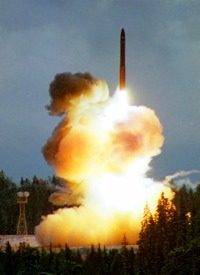
President Obama’s plans for a revamped "missile shield" for Eastern Europe has gained the support of Czech Prime Minister Jan Fischer and NATO Secretary General Anders Fogh Rasmussen.
Vice President Joe Biden is wrapping up a tour of Europe and — unlike the President’s recent trip trip to Copenhagen — it appears he will be returning to the United States with something to show for his efforts. According to CBSNews.com:
Last month, the Obama administration scrapped blueprints to base a missile defense shield in Eastern Europe designed to shoot down long-range missiles that might be fired from Iran or other nations.
Biden said Washington would send a team of experts to Prague next month for discussions.
The vice president has been touring Central Europe this week in an attempt to shore up broad support for the reworked missile defense plan and reassure critics that Washington remains committed to guaranteeing the country’s security.
The decision has sparked fears in formerly communist Eastern Europe that Washington was sacrificing its interests in order to improve ties with Russia.
On Wednesday, Poland eagerly signed on to the revamped U.S. missile shield.
There is little cause for surprise in the fact that leaders in Central and Eastern Europe are eagerly grasping at the offer of a missile defense; despite all the claims that such a defense system would be intended to deter aggression from Iran, many analysts viewed President Bush’s proposed missile shield as being directed primarily against Russia. According to the CBSNews.com story, a great deal of anxiety generated among European leaders was centered on the view that the Obama administration’s decision to revise Bush’s missile defense plans was focused on earning the "good will" of Russia.
Biden "should clearly explain the reasons that led the Obama administration to its decision not to build a radar in the Czech Republic," Former Prime Minister Mirek Topolanek said in a statement prior to the vice president’s arrival.
Topolanek, whose government signed treaties with the Bush administration to build the radar system and took a lot of heat from a majority of Czechs who opposed the plan, said the Obama administration’s moves toward Russia raise questions about "whether the United States is stepping back from the region of Central and Eastern Europe in exchange for better relations with Russia."
Former Czech President Vaclav Havel told the U.S.-funded Radio Free Europe/Radio Liberty that he expected Biden to "make it clear that America is interested in us, that someone else has not pushed us out of America’s field of vision."
Despite such concerns, Vice President Biden continues to maintain that the proposed defensive systems have not been developed with an eye toward containing any renewed Russian agression. As Deutsche-Welle reported during Biden’s visit yesterday to Romania:
In an address to Bucharest University, Biden said the "new missile defense architecture … will protect all NATO allies, including all central European NATO members" and would provide "stronger, smarter and swifter defenses."
NATO defense ministers are to meet in Slovakia on Friday where US Defense Secretary Robert Gates is set to brief US allies on Washington’s new plans.
Biden was quick to dismiss criticism that eastern Europe was being sacrificed in favour of appeasing Russia. "Some jumped to the conclusion that this new approach was designed to appeal to Russia at the expense of central Europe. They are wrong. Missile defence is not about Russia," Biden said. "What is true is that we are working to strengthen our relationship with Russia. We believe that a more constructive relationship with Russia will benefit us all."
But Biden admitted that Washington continued to have "disagreements with Russia on matters of principle" and was "against the notion of ‘spheres of influence’."
In remarks on October 23, Secretary General Rasmussen declared at a press conference that Obama’s proposed missile defense was critical for the defense of Europe and the United States:
On missile defence, Secretary Gates kicked off the discussion with a short briefing on the new US approach to European missile defence.
Ministers welcomed the fact the new US approach puts European missile defence more in a NATO context. That is good for the Alliance. It is good for solidarity. And to my mind, it is important for the defence of Europe that we are talking about rolling out a system within a couple of years that can provide European and North American citizens defence against a real and growing missile threat.
I think NATO Foreign Ministers will look to take this forward in December. And I hope that, by our Lisbon Summit next fall, we can agree to make European missile defence fully a NATO mission.
The significance of a proposed missile defense shield in Europe for American missile defense is hard to determine, since even the most fevered imaginings of the neoconservatives would have a hard time conjuring up a Iranian ICBM being intercepted over Poland on its way to the United States. Actually, Iran is credible regional threat in the Middle East, and Russia remains a credible regional threat in Eastern Europe. However, these facts raise several crucial questions: Roughly 20 years after the conclusion of the “Cold War,” why are tens of thousands of American troops and multimillion-dollar missile defense systems for Eastern Europe still considered to be in the vital national interest of the United States? Cannot the increasingly self-important European Union look to its own defense needs? And why would anyone imagine Iranian leaders are plotting late into the night to nuke Poland, Romania, or the Czech Republic?
Photo: AP Images



